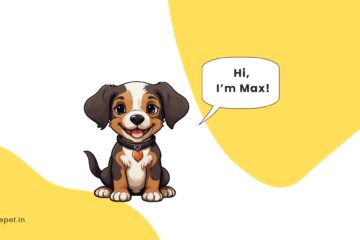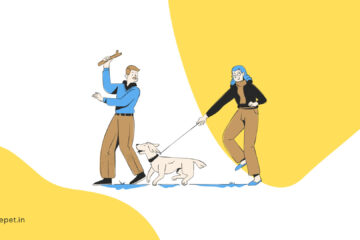Are you an aspiring future pet parent? Are you thinking about getting a furry companion, but you’re not quite sure where to start, right? You are in the right place.
Welcoming a dog into your home is a joyous adventure, especially when you choose the right four-legged friend. We understand that being a new pet parent can be overwhelming. There are plenty of dog breeds out there that are just perfect for first-time owners like you.
In this guide, we’re going to introduce you to the friendliest, most beginner-friendly pups around (Spoiler alert: The best dog for first-time owners has to be Labrador Retrievers.)
Dog breeds for first-time owners
Let us help you navigate the world of canine companionship by highlighting the easiest dogs to own, both small and large breeds. We’ll also shed light on breeds that might not be the best fit for first-time owners.
Let’s make sure you and your future furry friend start off on the right paw.
5 most easy-going dog breeds for beginner owners
Easy-going dog breeds are a dream come true for first-time owners seeking a low-maintenance furry companion. These delightful couch potato dog breeds are perfect for those who prefer relaxed, stress-free days. The best easy-going dog breed has to be Labrador Retrievers.
Imagine a loyal friend who requires minimal grooming and exercise, making your life wonderfully uncomplicated. So, if you’re a first-time owner looking for a laid-back, loving canine friend, these easy-going breeds are your ticket to a simple pet parenting experience.
- Labrador Retriever
- Bichon Frise
- Beagle
- Cavalier King Charles Spaniel
- Indian Pariah
1. Labrador Retriever
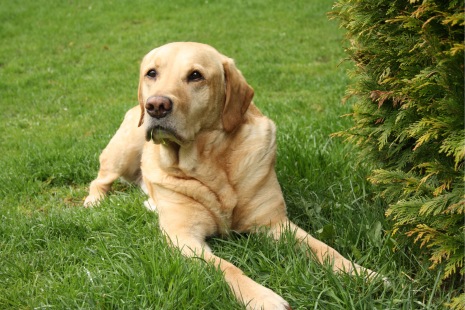
Labradors are known for their friendly and gentle temperament, making them ideal companions for first-time owners. Their playful nature and loyalty create an instant bond, while their adaptability makes them a perfect fit for families.
Growth: Labradors are medium to large-sized dogs, with males typically reaching a height of 56-61 cm (22-24 inches) and females reaching 54-59 cm (21-23 inches). They weigh between 29-38 kgs.
Grooming: They have a short, water-resistant coat that is relatively easy to groom.
Space Requirement: Labradors need ample space to move around, making them suitable for homes with gardens and open spaces.
Activity Level: Highly active and playful, Labradors require regular exercise and enjoy activities like fetch and swimming.
Cost of Maintenance: Labradors are moderately priced, with maintenance costs varying based on factors like healthcare and diet.
Food Habits: Labradors love to eat and have a hearty appetite. Although they will eat as much as they’re fed (they never stop), they require a balanced diet to maintain their energy levels.
Warning: Labradors are prone to getting overweight which causes a lot of health diseases. Remember to not overfeed them.
2. Bichon Frise

Bichon Frises are affectionate and cheerful, bringing joy to any household. Their small size and loving nature make them wonderful pets for first-time owners, especially those living in smaller spaces.
Growth: Bichon Frises are small dogs, reaching a height of approximately 23-30 cm (9-12 inches). They weigh between 5-8 kg.
Grooming: Their curly, hypoallergenic coat requires regular grooming to prevent matting.
Space Requirement: They adapt well to apartment living and don’t need a lot of space.
Activity Level: Moderately active. Bichon Frises enjoy short walks and indoor playtime.
Cost of Maintenance: Moderately priced, their maintenance costs include grooming, vaccinations, and occasional visits to the vet.
Food Habits: They have a small appetite, requiring high-quality, small-breed dog food.
3. Beagle
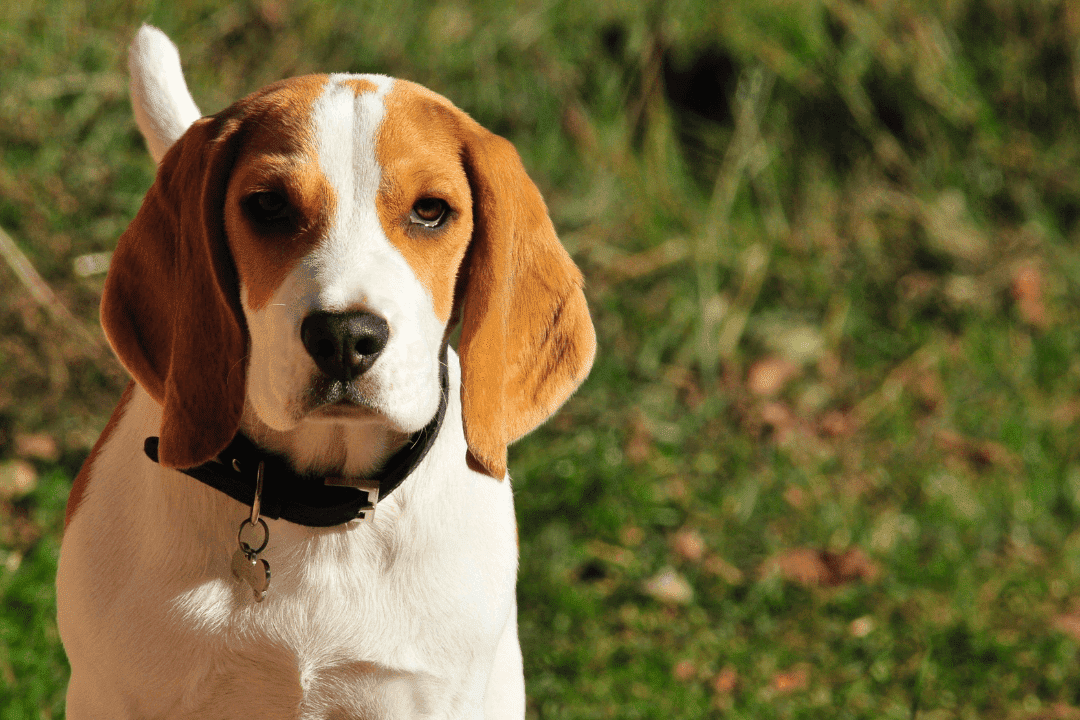
Beagles are friendly, curious, and great with families. Their lovable nature and moderate grooming needs make them an excellent choice for first-time owners. They are perfect for those seeking an active yet manageable companion.
Growth: Beagles are medium-sized dogs, reaching a height of around 33-40 cm (13-16 inches). They weigh between 8-14 kg.
Grooming: Short-haired and easy to groom, Beagles require regular brushing to keep their coat healthy.
Space Requirement: They do well in both apartments and houses, although regular walks are essential.
Activity Level: Energetic and playful, Beagles need daily exercise and mental stimulation.
Cost of Maintenance: Beagles are affordable to maintain, with costs primarily associated with healthcare and food.
Food Habits: Beagles love eating and will eat anything and everything. Ensure to provide a well-balanced healthy diet to maintain the ideal weight. Avoid overfeeding them ‘cause they’re prone to being overweight and diseases.
Fact check: Beagles belong to the scenthound family and have a sharp nose. If you get a beagle, remember to hide all your socks, ‘cause they love stealing them.
4. Cavalier King Charles Spaniel
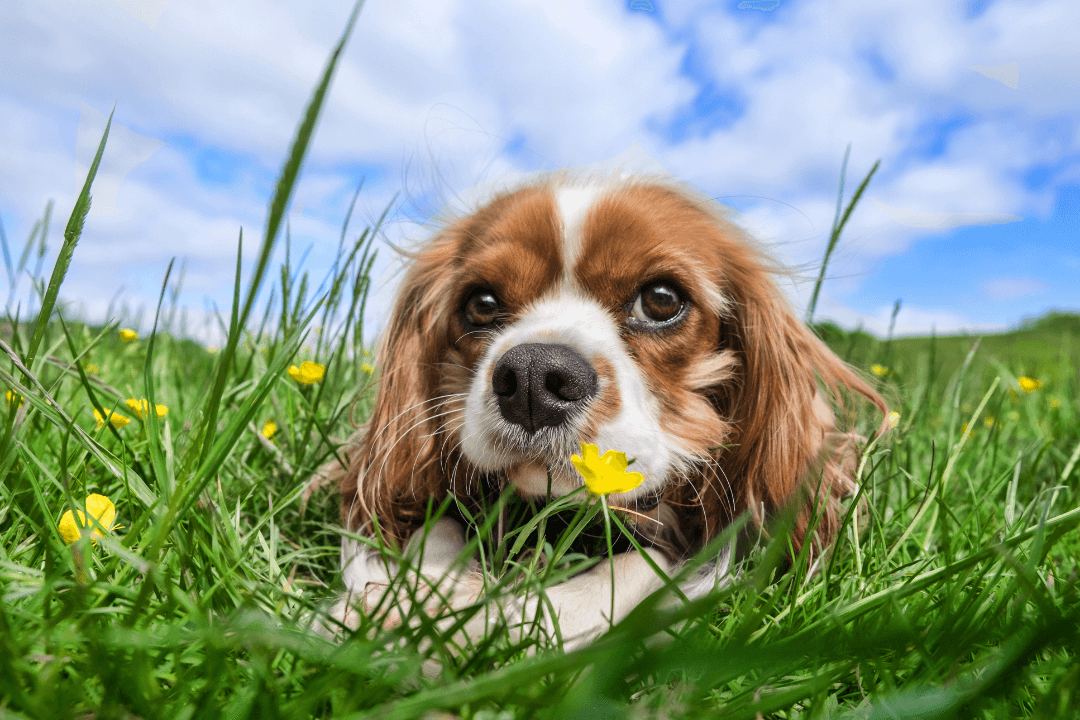
Cavalier King Charles Spaniels are affectionate, gentle, and sociable dogs. These royalty dogs have a unique friendliness about them and adapt to any kind of living space. They make wonderful companions for first-time owners, bringing endless love and joy to any home.
Growth: Cavaliers are small to medium-sized dogs, reaching a height of around 30-33 cm (12-13 inches). They weigh between 6-9 kg.
Grooming: They have a silky, medium-length coat that requires regular brushing to prevent tangles.
Space Requirement: Charles Spaniels can adapt to any space including apartments. However, they do enjoy outdoor walks and playtime.
Activity Level: Moderately active. They enjoy both outdoor and indoor relaxation.
Cost of Maintenance: Moderate, with expenses related to grooming, healthcare, and high-quality dog food.
Food Habits: They’re not hungry busters like Labradors but they require a balanced diet containing high-quality dog food to maintain their health and silky coat.
5. Indian Pariah

Indian Pariahs are loyal, intelligent, and resilient dogs, reflecting the true spirit of Indian street dogs. They are very adaptable and are one of the most easy-going breeds. They develop deep connections with owners and hence make fantastic best friends for first-time pet owners.
Growth: Indian Pariahs vary in size but are generally medium-sized dogs, reaching a height of around 45-55 cm (18-22 inches). Their weight can range between 11-20 kg.
Grooming: They have short coats and minimal grooming needs, making them very low-maintenance.
Space Requirement: Indian Pariahs enjoy living in any kind of space including apartments, big houses with yards, etc.
Activity Level: Moderately active. Indian Pariahs love outdoor walks and lots of playtime, but they also appreciate indoor relaxation.
Cost of Maintenance: Indian Pariahs are very cost-effective pets, with expenses primarily related to healthcare and food.
Food Habits: They have a moderate appetite. They should be fed a balanced diet containing homemade or commercial dog food.
Fact: Indian Pariahs aren’t disease-prone and are very easy to maintain. They also serve as excellent guard dogs.
5 small dog breeds for first-time pet parents
Choosing the right furry companion is essential, especially when considering small dog breeds. Personally, pugs are the most hassle-free small dog for first-time parents. Here’s a list of five great options for you:
- Pug
- Yorkshire Terrier
- Shih Tzu
- Maltese
- Pomeranian
1. Pug

Pugs are a practical choice for first-time pet parents due to their low-maintenance needs. These small dogs require minimal grooming and adapt well to various living spaces. Their friendly and affectionate nature makes them a straightforward addition to any household.
With their easygoing temperament, Pugs provides a hassle-free pet ownership experience for beginners.
Growth: Pugs are small-sized dogs, weighing around 6-8 kg and reaching a height of 10-12 inches.
Grooming: Grooming is relatively very easy because of their short coat. However, you need to pay attention to their facial wrinkles and clean them regularly.
Space Requirement: They can adapt to several living spaces. If you’re looking for an apartment dog, a pug might be an amazing option.
Activity Level: Pugs are not very active dogs. Short walks and indoor playtime are sufficient.
Cost of Maintenance: Pugs are very affordable to maintain. Their maintenance costs include healthcare, grooming, and high-quality dog food.
Food Habits: Since pugs are lazy, their diet needs to be observed so they don’t gain extra weight. They have a moderate appetite and require a balanced diet of dog food.
Tip: If you’re going to be a lazy pet parent and do not want to go on runs twice a day with your dog, pugs might be the best breed for you. You could easily cuddle up with them on the couch for a movie.
2. Yorkshire Terrier

Yorkshire Terriers, or Yorkies, make perfect pets for first-time owners. Their small size fits well in any home, and while they require regular grooming, their loyalty and affectionate nature make them incredibly rewarding companions. Yorkies’ adaptability and intelligence simplify the pet parenting journey.
Growth: Yorkshire Terriers are tiny dogs, weighing around 1.8-3.2 kg and reaching a height of 7-8 inches.
Grooming: Their long, silky coat requires regular grooming, including brushing and occasional professional trimming.
Space Requirement: Yorkies do well in apartments but enjoy indoor playtime and short walks.
Activity Level: Moderately active, they appreciate indoor activities and brief outdoor adventures.
Cost of Maintenance: Maintaining a Yorkie involves grooming expenses and regular vet check-ups, making them moderately priced.
Food Habits: They have a small appetite, requiring high-quality, small-breed dog food.
3. Shih Tzu
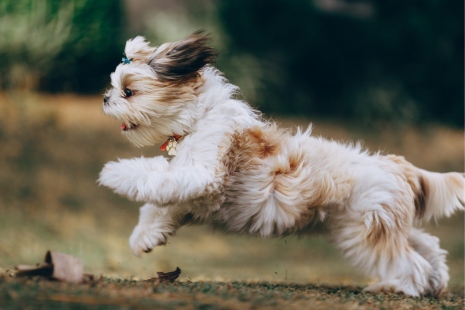
If you’re a first-time pet parent, a Shih Tzu is another great choice. Despite their grooming requirements, their friendly and adaptable nature makes them delightful companions. You’ll appreciate their affectionate temperament, making every day with them special and rewarding.
Growth: Shih Tzus are small dogs, weighing around 4-7.3 kg and reaching a height of 9-10.5 inches.
Grooming: They have a long, luxurious coat that requires daily brushing and professional grooming.
Space Requirement: Shih Tzus can be perfect for apartments and small spaces, although they thrive well in big spaces too.
Activity Level: Although they are not the most active dogs, they do enjoy indoor playtime and slow walks outside.
Cost of Maintenance: Maintaining a Shih Tzu can be moderately heavy on your pockets as they require regular grooming, occasional vet visits, and high-quality food to maintain their coat.
Food Habits: They don’t have a big appetite but require a balanced diet to maintain their coat health.
4. Maltese

Maltese dogs are an excellent choice. Despite their small size, they have a big heart, offering endless affection and joy. These little dogs are very gentle in nature making them perfect for beginners.
Growth: Maltese dogs are tiny, weighing around 1.8-3.2 kg and reaching a height of 7-9 inches.
Grooming: They have a long, silky coat that requires daily brushing and regular professional grooming to prevent tangles.
Space Requirement: Maltese are perfect for staying in apartments and small spaces. In fact, they’re so small they could get lost in big houses.
Activity Level: Due to their small size, they aren’t very active and tire out easily. They do enjoy indoor playtime and short walks.
Cost of Maintenance: Maltese dogs require regular grooming, dental care, and vet check-ups. Hence, the cost of maintenance can be a little high.
Food Habits: Their small bodies don’t require huge portions. They require high-quality, small-breed dog food.
5. Pomeranian
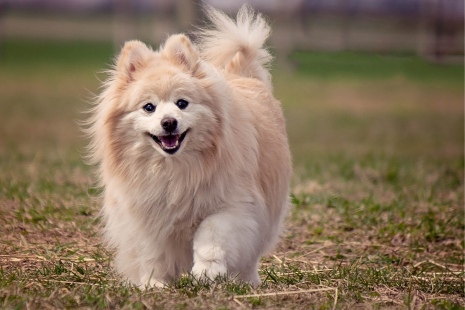
If you’re stepping into pet parenthood for the first time, consider a Pomeranian. Yes, their fluffy double coat needs attention, but their lively spirit and intelligence make them captivating companions.
Growth: Pomeranians are small dogs, weighing around 1.8-3.2 kg and reaching a height of 7-12 inches.
Grooming: They have a thick double coat that requires regular brushing to prevent mats and occasional professional grooming.
Space Requirement: They are adaptive dogs and hence can adjust in both big and small spaces.
Activity Level: Moderately active, they enjoy indoor play and short outdoor walks.
Cost of Maintenance: Pomeranians require regular grooming and dental care, making them moderately priced.
Food Habits: They require small-breed dog food and do not have a big appetite.
Large dog breeds for new owners
If you’re someone who would love to cuddle with your dog on the bed in winter mornings, then a large dog would be perfect for you. There’s nothing like snuggling with your large bear-like puppy.
You don’t have to worry about getting a bigger breed because you’re a beginner. Love and knowledge are all you need to take care of a dog, big or small. So here’s a list of the best 5 large dog breeds for new owners, the winner being the Golden Retriever.
- Golden Retriever
- Great Dane
- Doberman
- Boxer
- Mastiff
1. Golden Retriever
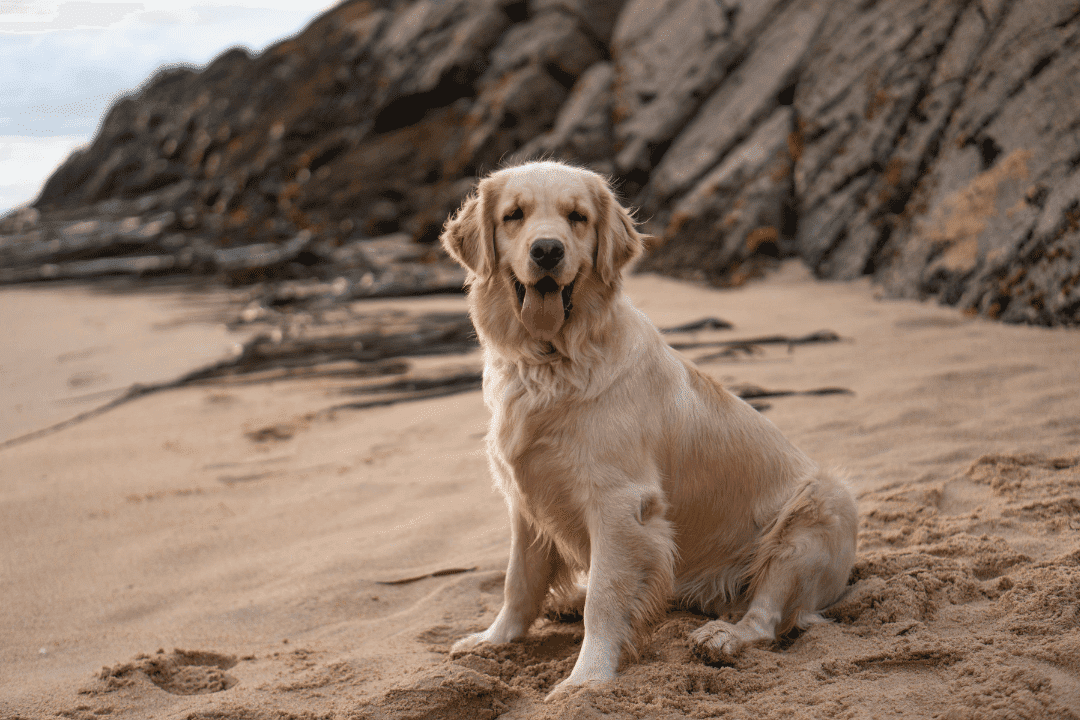
Golden Retrievers are best known for their friendly, gentle, and loving nature. They are excellent with families, displaying patience and loyalty.
Goldens are highly adaptable and they are famous for being one of the most joyous and cheerful dog breeds. They’re perfect for first-time owners ready for a big heartful experience.
Growth: Golden Retrievers are large dogs, weighing around 27-34 kg and reaching a height of 22-24 inches.
Grooming: Goldens have a dense, water-repellent double coat. Grooming can be a hassle because you need to do it every day without fail. Occasional professional grooming is also beneficial.
Space Requirement: Golden Retrievers need ample space due to their size. Apartment living might not be suitable. Houses with large spaces are the ideal option.
Activity Level: Retrievers are highly active breeds. You need to provide regular exercise and running. They love outdoor playtime like fetch and occasional swimming.
Cost of Maintenance: They need high-quality dog food to maintain their health and coat. Hence, maintaining and golden can be a bit pricey due to grooming and vet requirements.
Food Habits: Since they’re energetic, they need a healthy and balanced diet regularly.
Fact: Goldens are highly energetic, hence, they might not be the best option for you if you live in a small space and cannot provide enough outdoor playtime. Also, they eat a lot.
2. Great Dane

Great Danes may be large, but they are gentle giants known for their friendly and affectionate personalities. They are surprisingly gentle with children and can be a loyal and protective friend for first-time owners.
So if you’re looking for both security and warmth, a Great Dane is a great option.
Growth: Great Danes are giant dogs, weighing around 54-91 kg and reaching a height of 28-34 inches.
Grooming: Grooming is relatively easy because they have a short coat.
Space Requirement: Despite their size, Great Danes adapt well to apartment living but need sufficient room to move around.
Activity Level: Although they’re big they’re not as energetic as Goldens. They merely require regular walks and indoor playtime.
Cost of Maintenance: Because of their big size, they need larger portions of food. Other than that, there’s the basic cost of healthcare. Overall, they’re moderate in terms of maintenance.
Food Habits: They have a hearty appetite and they require a healthy and balanced diet to keep up with their growth and strength.
3. Doberman

Dobermans are incredibly loyal and smart companions. Even though they might look imposing, they have a soft side, especially when it comes to their families. With the right training and love, they quickly become devoted friends.
For first-time pet parents wanting a watchful yet affectionate furry member, Dobermans are an excellent choice. Their protective nature adds a reassuring sense of security, making them not just pets but cherished family members.
Growth: Dobermans are medium to large-sized dogs, weighing around 27-41 kg and reaching a height of 24-28 inches.
Grooming: They have a short coat that is low-maintenance, requiring occasional brushing.
Space Requirement: They are quite adaptive and can thrive in apartments and big houses alike.
Activity Level: Highly active, Dobermans require daily physical and mental challenges to stay engaged.
Cost of Maintenance: Their maintenance costs are Moderately priced, with costs related to healthcare, training, and high-quality dog food.
Food Habits: Although huge, they have a moderate appetite. They require a balanced diet for their high energy.
Fact: Dobermans are very loving and loyal. They can develop close connections with their owners and are more like family members than pets.
4. Boxer

Boxers are lively and loyal pals, full of joy and love for playtime. They adore children and have a natural protective streak. They are wonderful companions for new pet parents.
With their playful spirit, they bring life and happiness to any home, making every day a delightful adventure.
Growth: Boxers are medium to large-sized dogs, weighing around 27-32 kg and reaching a height of 21-25 inches.
Grooming: They have a short coat that is easy to groom, requiring regular brushing to keep it healthy.
Space Requirement: They adapt well to various living spaces but need regular exercise and playtime.
Activity Level: Boxers are playful and energetic. These highly active dogs require daily physical activities and mental stimulation.
Cost of Maintenance: Boxers need high-quality dog food and training. Hence, they can be moderately priced.
Food Habits: Boxers have a healthy appetite. Provide them with a healthy diet to keep up with their growth and energy levels.
Remember: Boxers can be very gentle and loving as long as they’re well-trained. All dogs require basic training to live a healthy and confident life.
5. Mastiff
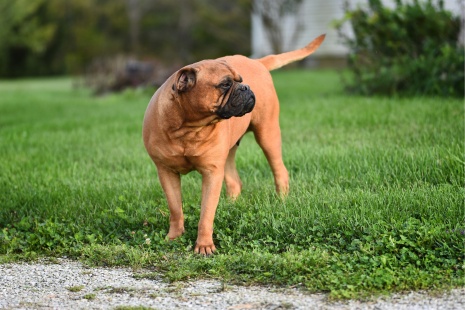
Mastiffs are like gentle giants, exuding calmness and affection in every wag of their tails. They’re fiercely loyal, standing guard with a protective embrace, making them ideal for families.
Despite their size, they have a sweet demeanor that adds a comforting presence. They are a wonderful choice for first-time pet parents seeking a loving and reassuring friend.
Growth: Mastiffs are giant dogs, weighing around 54-91 kg and reaching a height of 27-33 inches.
Grooming: They have a short coat that is low-maintenance, requiring occasional brushing to remove loose hair.
Space Requirement: Despite their size, Mastiffs can adapt to apartment living but need ample space to move around comfortably.
Activity Level: Low to moderate activity level, they enjoy leisurely walks and indoor relaxation.
Cost of Maintenance: Moderate to high, with expenses related to healthcare, larger portions of food, and occasional grooming needs.
Food Habits: They eagerly devour their meals, needing a balanced diet to sustain their size and strength.
Fact check: It’s not uncommon for Mastiffs to skip meals sometimes. They are known to eat only when they’re hungry. Hence, you don’t really have to worry about overfeeding them.
Worst dog breeds for new parents
Every dog deserves love, and with the right training and care, they can thrive. However, some breeds like the German Shepherd, Dalmatian, Siberian Husky, Pitbull, and Akita might be a bit challenging for new parents.
It’s not that these breeds are bad, not at all! In fact, with proper training and attention, they can be incredibly sweet and loyal companions. But, because they’re spirited and strong-willed, they might need experienced pet parents who understand their unique needs.
For beginners, starting with a breed that matches their level of experience and lifestyle might ensure a smoother journey into the world of pet parenting.
1. German Shepherd
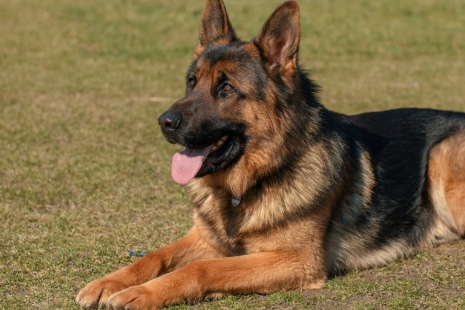
German Shepherds are incredibly smart and loyal, making them potential best friends. However, their strong-willed nature might require someone experienced to handle their spirited personalities effectively.
With consistent training and attention, they can turn into wonderfully affectionate companions. Yet, their energy levels and need for mental engagement often demand the expertise of seasoned dog parents.
2. Dalmatian
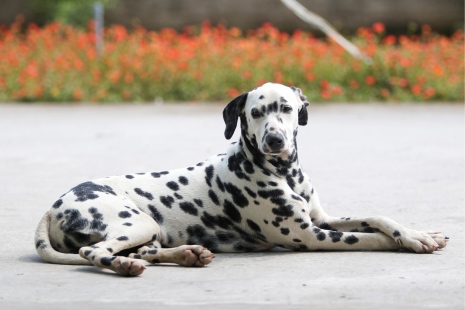
Dalmatians, with their charming spots and lively spirits, are full of energy and enthusiasm. Yet, their independent streak can pose a challenge for new pet parents.
Patient training and socialization from day one are crucial to bring out their affectionate side. They need a lot of exercise regularly, if your lifestyle does not allow you an ample amount of playtime with your dog, you might not want to get a Dalmatian.
3. Siberian Husky

Siberian Huskies are magnets for outdoor enthusiasts. They are very adventurous and their independent nature demands confident handling and regular exercise.
Novice pet parents might find their energy levels a bit overwhelming. Huskies require someone who can keep up with their high spirits and provide the structure they need to thrive.
Since they’re very high energy and have very thick coats, maintenance can be on the harder side. Maybe huskies can be your second dog, but being the first one can pose a challenging lifestyle.
4. Pitbull

Pitbulls come with big hearts and strong bodies. Although they’re not famous for it, they are incredibly affectionate beings.
Nevertheless, their strength calls for experienced guidance and consistent training. Their loyalty knows no bounds, but their physical prowess might be a handful for new pet parents.
With patient training and responsible ownership, Pitbulls can showcase their gentle side, needing someone who understands their potential and can channel it positively.
5. Akita
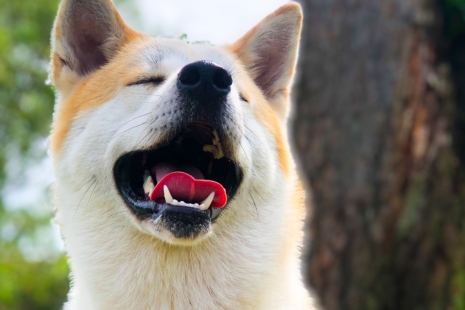
Akitas are fiercely loyal protectors. They are independent dogs and are not very fond of strangers. Hence, they require skillful handling and early socialization.
While they form deep bonds with their families, their protective nature might be a challenge for novice pet parents.
How to adopt/buy the best dogs? (For Beginners)
Deciding to adopt or buy a dog can be a little overwhelming. For buying, you need to contact breeders and pet shops. For adoption, you mostly have to contact animal shelters and research dogs up for adoption.
The steps involved with the two processes have been mentioned below.
Adopting the Best Dog
- Research Animal Shelters: Begin by researching local animal shelters and rescue organizations in your city or town. Look for reputable shelters with positive reviews and good track records in animal welfare.
- Visit Shelters: Visit the shelters in person. Spend time interacting with the dogs available for adoption. This firsthand experience will help you understand their behavior and temperament.
- Ask Questions: Don’t hesitate to ask the shelter staff about the dog’s history, vaccinations, and health. It’s essential to gather all necessary information before making a decision.
- Consider Adoption Events: Many shelters in India host adoption events, especially during festivals. Attend these events to meet multiple dogs at once, increasing your chances of finding a suitable match.
- Prepare your Home: Prepare your home for the new pet. Ensure you have the necessary supplies, including food, water bowls, a cozy bed, a leash, and toys.
- Process the Adoption: Complete the adoption paperwork, which usually includes a nominal adoption fee covering vaccinations and sterilization.
Buying the Best Dog
- Research Dog Breeds: Research dog breeds suitable for the Indian climate and your living situation. Consider local breeds like Indian Pariah dogs, or breeds that adapt well to the heat, such as Labrador Retrievers and Indian Spitz.
- Find Ethical Breeders: Look for ethical breeders in India who prioritize the health and well-being of their dogs. Seek recommendations from local veterinarians or pet owners’ communities.
- Visit Breeders: Arrange visits to the breeder’s facility. This visit allows you to assess the living conditions, meet the puppy’s parents, and ensure ethical breeding practices.
- Ask Questions: Prepare a list of questions for the breeder. Inquire about the puppy’s health history, vaccinations, and diet. Responsible breeders are transparent and willing to provide information.
- Conduct Health Check: Ensure the puppy has received necessary vaccinations, deworming, and a health certificate from a veterinarian. Verify the authenticity of the vaccination records.
- Prepare Your Home: Set up a comfortable space for the new puppy. Have food, water bowls, bedding, and toys ready before bringing the puppy home.
What are the best dog breeds for single men?
As a single man getting a dog is a wonderful thing to consider. A dog would not only be a constant companion but also support you through life as a loyal friend. Here are the best dog breeds for men to consider:
- Labrador Retriever
- Boxer
- German Shepherd
- Pitbull
- Golden Retriever
What are the best dog breeds for single women?
Dog breeds for women can range from Dobermans to Poodles. Women need someone to talk to and dogs are known to be the best listeners. Here’s a list of the best dog breeds for single women:
- Golden Retriever
- Siberian Husky
- King Charles Cavalier Spaniel
- Yorkshire Terrier
- Beagle
What are the best dogs for couples?
If your life as a couple, staying with your partner, and hustling through busy schedules is getting boring, maybe getting a dog would be a solution. If you’re not ready for children, starting your parenting journey with a dog would be a delightful learning experience.
Here’s a list of the best dogs for couples:
- Border Collie
- Australian Shepherd
- French Bulldog
- Indian Pariah
- Dachshund
What are the best dog breeds for families with children?
The best dog breeds for families with children are:
- Pug
- Golden Retriever
- Beagle
- Labrador Retriever
- Bulldog
Which dogs are not good for first-time owners?
As mentioned, the dogs that are not so good for first-time owners are:
- German Shepherd
- Dalmatian
- Siberian Husky
- Pitbull
- Akita
Which dogs make the best pets for new owners?
The best pets for new dog owners are:
- Labrador Retriever
- Bichon Frise
- Pug
- Golden Retriever
- Shih Tzu

